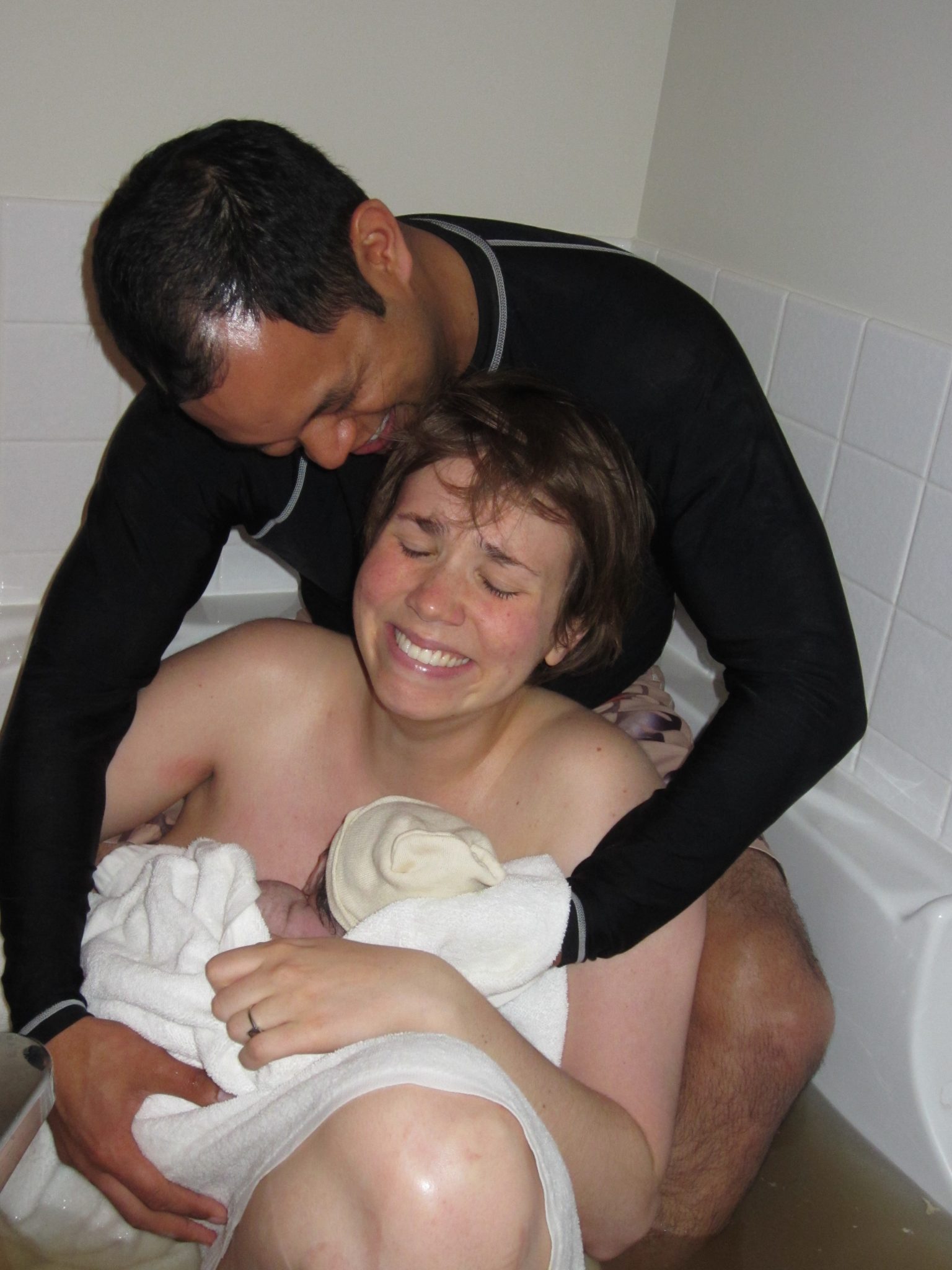
Jessica Rivera, a chiropractor in Omaha Nebraska who organized the Birth Empowerment Dialogue conference, herself had a beautiful, empowering home birth. Photo courtesy of Jessica Rivera.
“I just lo-oved being pregnant,” a plump woman with platinum blond hair chirped when she saw me waddling through the airport. “I loved every minute of it.”
Hearing those words filled me with despair and shame.
Yes, I was thrilled to be pregnant.
Yes, I wanted to have a baby more than anything I’d ever wanted in my life.
But, no, I was not loving every minute of it.
I was nauseous for the first six and a half months of pregnancy.
An energetic person, being pregnant left me exhausted all the time.
As I walked home from work I would gaze at the sidewalk longingly, thinking it looked like a good place to nap.
My eyes were perpetually swollen from the strain of holding back tears, not because I was unhappy but because I was so emotional.
I lost that battle more than I won it.
Telephone commercials made me cry.
The sound of a baby crying made me cry.
The sound of a baby laughing made me cry.
When my husband was late coming home one night I met him at the door sobbing. I’d spent the last hour imaging his legs at a gut-wrenching angle sticking out of the window of our crashed car, his blood seeping into Buford Highway.
(He was stuck in traffic.)
I know the woman in the airport meant well.
She looked at my basketball-sized belly and remembered wistfully how happy she had been when she was pregnant all those years before.
But some things women say to each other about pregnancy and childbirth just. aren’t. helpful.
“I loved it so much” is one of them.
So what do you say to a pregnant woman about pregnancy and childbirth?
There’s so much those of us whose wombs are closed for business wish that we had known in advance.
We made so many mistakes that we want to spare the next generation of women with burgeoning bellies.
When I was invited to speak at a Birth Empowerment Dialogue (B.E.D.) in Nebraska, I needed to figure out a way to tell pregnant women and women hoping to become pregnant what I wanted them to know about pregnancy and childbirth in a way that they could hear and that might actually help them have a positive pregnancy and empowering childbirth.
I’m going to tell you what I told the moms and dads who came to B.E.D. with me.
And then I’ll explain why everything I said was wrong.
(This may be the longest post in the history of this blog. I’ll still love you if you don’t manage to read it all.)
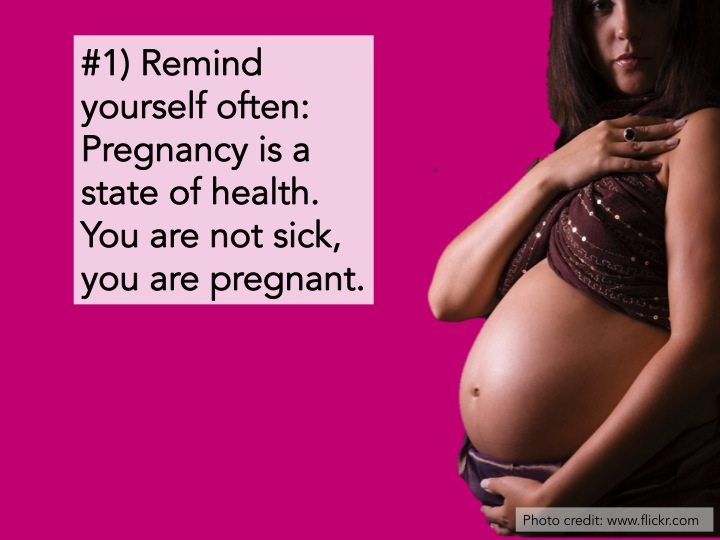
1) Pregnancy is a state of good health
It’s actually much harder to get pregnant than most people realize.
I interviewed a mama who got pregnant with her fourth baby—oopsie doopsie—when her third was only eight months old and the same week she had been planning to get an IUD.
We all know stories like that.
But the truth is an amazing number of hormonal and physical processes have to happen in your body—at just the right time and in just the right way—to have a fertilized cell embed in the lining of your uterus.
When your pregnancy is established and you are actually showing, you become a walking advertisement:
“YES, I’VE HAD SEX!”
and, “THIS IS WHAT GOOD HEALTH LOOKS LIKE!”
But instead of feeling healthy, I sat in the car in the parking lot and cried after every prenatal appointment.
I did not feel like I was being cared for.
I felt like I was being belittled, bullied, and terrified by statistics about negative outcomes and what if’s.
The hospital midwives in Atlanta, Georgia, who were supposed to be gentler than the doctors, treated my pregnancy like it was an accident waiting to happen.
They scared me at every appointment.
They acted like I was sick.
I know they were “just doing their job” and they meant well—I truly believe every healthcare provider means well—but they did me a big disservice, making me feel unloved and uncared for and un-listened to.
So, the first thing I wish every pregnant mama knew is that you and the people around you should remind yourselves at least a dozen times a day that PREGNANCY IS A STATE OF HEALTH.
Tell yourself often:
I AM HEALTHY.
MY BODY IS STRONG.
I AM GOING TO HAVE A HEALTHY BABY.
In between running to the bathroom for another visit with the porcelain goddess, groaning over varicose veins, and clutching your painful lower back.
I’m **not** saying it’s easy to be pregnant. In fact, if you’re one of those women who gets your glow on, is all serene and peaceful and just LOVES being pregnant, like that platinum blonde in the airport all those years ago, we probably can’t be friends.
But most of us have a ticker tape in our heads, like the stock prices on Wall Street that run under the newscast. We are talking to ourselves all the time. Let that self-talk be positive and congratulatory. Affirm and reaffirm that you are healthy. And isn’t it cool that your body knows how to grow eyebrows on another human being?
2) Your baby is what YOU eat
As my friend Andrea Laurel Merg, a childbirth educator, likes to tell her mamas, “You are what you ate three months ago.”
It’s true. The number one lifestyle change you can make to have a healthy pregnancy is to pay attention to what you eat and to eat healthy food.
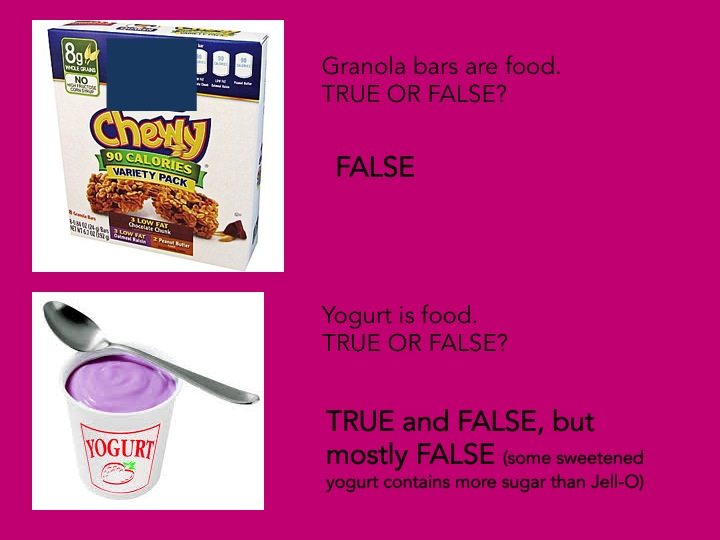
Despite clever marketing, granola bars and sugary flavored yogurt are not healthy foods
But who the heck knows what “healthy food” actually means?
It seems like every day there is a new study about good eating and good health. Fish is good for you. Ack, fish contains too much mercury.
Peanut butter is high in protein. Ack, eating too many peanuts can cause your kid to have allergies when they are older.
Pregnant mamas, you know this already but it’s my job to remind you anyway.
During pregnancy and childbirth: EAT FOOD not EDIBLE FOOD-LIKE SUBSTANCES
You would think this would be obvious and easy, but eating real whole food is actually a radical act in today’s junk-food happy America.
A case in point: Flying to Nebraska from Oregon, I sat on the airplane next to two women. One was a doula, the other a beautiful young pregnant mama who told me she was due in May.
They ordered ginger ale and ate the fruit chew candy snacks they had brought with them on board.
Ginger ale is tasty but it isn’t food.
Chewy fruit snacks are cleverly marketed as “fat-free,” “gluten-free,” and “all natural,” but they are actually sugar and corn syrup laden crap filled with Red 40 that has been found to be contaminated with carcinogens, cause allergic reactions, and to possibly cause reticuloendothelial tumors of the immune system in rates in industry-sponsored scientific testing (source).
3) Exercise is your best friend
During pregnancy and childbirth you need to move your body and exercise as much as you can, especially by being active throughout the day. Pregnant lady exercise can look like this:
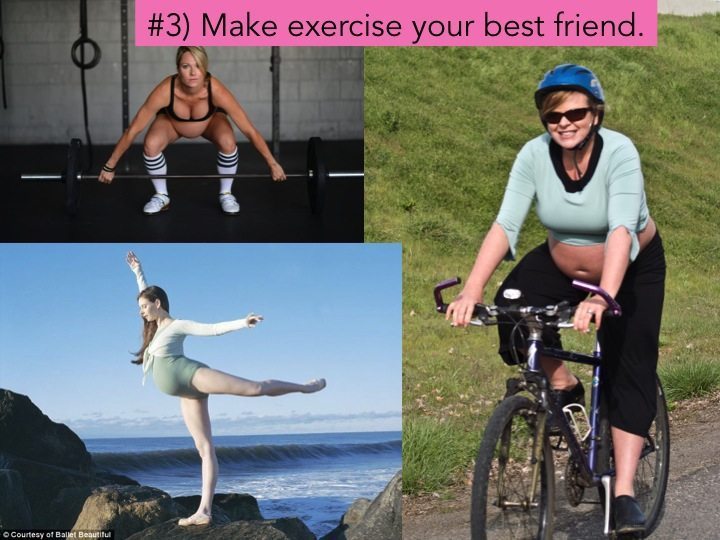
Or it can look like something else.
You don’t have to be a cross fit champion or professional ballerina or a bicycle racer but you can be all those things and have a healthy pregnancy.
For the rest of us mere mortals, it’s just important for us to move our bodies, every day, as often as we can.
- Take the stairs instead of the elevator.
- Go on a 20-minute walk with your partner or a friend.
- Sign up for a prenatal swimming class.
- Park 5 or 10 blocks away from where you need to be so you get a walk.
- Stand instead of sit as often as you can.
Pregnancy and childbirth: the importance of exercise
Exercise is much more important than doctors realize. Williams Obstetrics, the 1385-page reference book that every obstetrician in the country uses, includes only three paragraphs on exercise during pregnancy and one table on the contraindications to aerobic exercise!
The paragraphs themselves are more about the dangers of exercise than the importance of it, saying that “each activity should be reviewed individually for its potential risk” (page 206), but conceding that pregnant women should be encouraged to engage in moderate-intensity physical activity 30 minutes or more a day.
Childbirth is a massive physical undertaking that puts huge physical demands on your body. There are literally thousands of peer-reviewed studies that show myriad benefits to exercising.
Exercise is so important that it has been identified by sociologists and psychologists as a “keystone habit.” As one writer explains:
When people start habitually exercising, even as infrequently as once a week, they start changing other, unrelated patterns in their lives, often unknowingly. Typically, people who exercise start eating better and becoming more productive at work. They smoke less and show more patience with colleagues and family. They use their credit cards less frequently and say they feel less stressed. It’s not completely clear why. But for many people, exercise is a keystone habit that triggers widespread change. “Exercise spills over,” said James Prochaska, a University of Rhode Island researcher. “There’s something about it that makes other good habits easier.” (The Power of Habit, pages 108-109.)
Studies show that exercising during pregnancy not only helps women have an easier labor, it helps their babies enjoy better health as well.

During pregnancy and childbirth your mental health also matters. It’s hard to have a baby if you aren’t psychologically healthy.
4) Your psychological health matters
Your psychological health matters.
Pregnancy is a time of emotional highs and lows and it helps to have anger and stress management techniques in place to help you through them.
If you had a difficult childhood, this is also a good time to work on your feelings towards your own parents, as well any fears you have about becoming a parent yourself.
Your relationship with your partner also matters. A lot.
Ina May Gaskin, arguably the most famous midwife in America, recommends kissing while in labor. She has found that if a woman’s lips are relaxed and open her cervix will also relax and open.
Great advice. But you never know how you are going to feel about your partner once you’re in labor. You may be cursing him (“This is all your fault!”) or you may be feeling quite loving.
Whatever happens during labor, the goal in birthing and raising children with someone you love is for those children to leave you eventually, once they are fledged, but for your partner to be in your life even after the nest is empty.
So it’s important to figure out a way to be a team, how best to communicate, how best to love each other, and how to make each other feel special. You’ll be needing those skills and putting them to use more often than you think both during labor and after the baby is born.
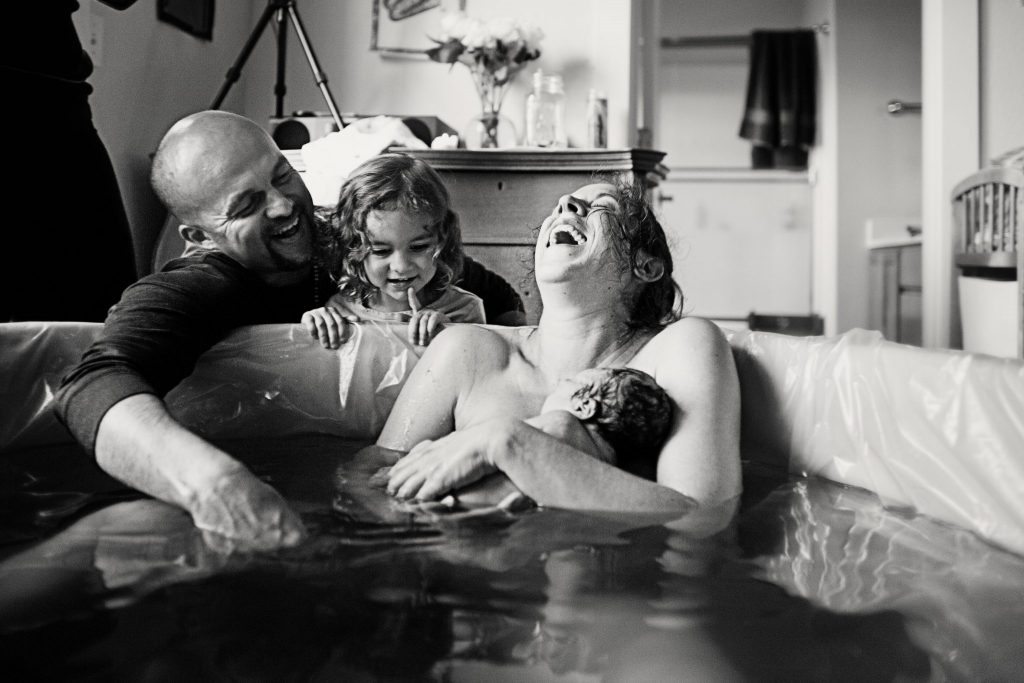
Birth is hilarious and fun and joyful. Don’t let anyone tell you otherwise. Photo courtesy of Crystal Garcia.
5) Birth is hilarious. And fun, sensual, and totally empowering. And, yes, it hurts like heck (for some of us). But the pain is there for a reason
As I said in this interview, having a baby is kind of absurd: you are squeezing an entire human being out the most private part of your body.
We often forget to tell women how fun it is to have a baby. Your body is flooded with hormones that heighten your awareness, colors look more vivid, smells are more pronounced. Some women report feeling an ecstasy akin to being high. You are in an altered state of awareness as your baby and your body do an intricate dance.
During my fourth pregnancy I tried to convince myself that birth was not painful. I took a bath almost every night and meditated, repeating the positive affirmations I had thought up for myself: I will have a beautiful birth, my body will open, the baby will be coming into a world of love, I am one in a long line of women who have come before me…
I told myself that “pain” was the wrong word, that I would not feel pain.
It doesn’t have to be painful
Some women do not experience childbirth as painful. That childbirth has to be painful is a myth we have been brainwashed to believe.
I thought I would be one of those women, this time, who did not experience labor as painful. After all, I’d been saying my affirmations and meditating for months.
I was wrong.
When I was in the throes of labor I made deep primal noises—expressions of pain—that I had never made before.
All my ideas about not feeling pain flew out the window.
It hurt.
But my home birth was also a lot of fun. In between toe-numbing contractions, happy anticipation flooded my body: I couldn’t wait to meet a small being who’d been keeping me company for nine months and with whom I was already in love. I also felt very close to my husband (see #4). He was present and attentive and brought me homemade vegetable juice. And I felt deeply connected to the women in my family who had come before me, remembering that I was one in a long line of powerful women who had successfully given birth.
Remember that pain during pregnancy and childbirth is information
So there you have it: birth might hurt but the pain is not something to fear. Giving birth might feel overwhelming while you are doing it. You might have to make a conscious effort to quiet your mind and to step out of the way. You do this in order to let your body do what it knows how to do. But every time you feel any kind of pain it helps to remember that the pain is there for a reason: it’s your body communicating with you, telling you to shift positions, asking you to listen.
I was not able to remember to be curious and interested in the pain during my first labor. With hospital doctors literally standing over me, I was pressured into getting Pitocin, which I did not want or need. The pitocin was to “speed things along.” But birth is not some kind of race to the finish line.
The doctors and nurses chastised and humiliated me. One doctor scolded me for “being selfish” because I wanted to have an unmedicated, normal, natural vaginal birth. My husband was not the experienced labor supporter he is now and he felt scared and worried. The doctor’s threats frightened him. My poor husband had a hard time watching the woman he loved in so much seemingly unproductive pain.
My mother was there too, but she sat in a corner correcting a manuscript. So, I really had no one to advocate for me. For months, even years, afterwards I felt like a failure.
I wasn’t a failure.
But I was failed by the system during my first childbirth.
Birthing women have the right to feel listened to and cared for.
We have the right not to be belittled and threatened.
Yet most doctors forget that birth is hilarious and bizarre and fun.
Have your birth attendants ready stupid jokes to tell you during labor, surround yourself with patient, experienced people. Cover every clock and don’t let anyone time your contractions. Use hydrotherapy (a warm bath or shower) to combat the pain. Have your doula or partner shake your booty with a rebozo. Birth is not a race or an endgame. Birth is a process of discovery and an emergence into motherhood. Allow yourself to enjoy it.
6) Let other people care for you during pregnancy and childbirth. You give them a gift when you accept their help
In my family growing up asking for help was a sign of weakness.
At age 29, when I had my oldest daughter, I did not know how to ask for help. I did not even know how to accept genuine offers of help. A friend called and said, “We want to see the baby, should I bring over some lunch?” I mumbled something about, “That’s okay, you don’t have to bother. We don’t need anything.”
But we did. Desperately. I absolutely needed help though I’m not sure I even knew it at the time. When my friend and her mom, who was visiting from out of town, came over to see the baby, I ended up making everybody lunch. My daughter was only five days old.
It was, honestly, my own fault. I did not say, “Yes, please. Bring us some food. I’m tired and overwhelmed and my boobs hurt.” I didn’t know how.
My body tells me I have to slow down
A breast infection and a high fever got me out of the kitchen and back in bed. I know realize this was my body’s way of communicating to my stubborn and neurotic mind that I needed to stop trying to be SuperMom, give my Type A personality a rest, and allow myself to sleep, marvel at the baby, and stop worrying about everyone else.
Today I would be able to accept Veronica’s offer to help. I would even be able to say, “Actually, we’re not really ready for visitors yet. We’re having a babymoon right now and not socializing. I’m dying for you to see the baby AFTER your mom leaves town and when my breasts aren’t so leaky! Thank you for offering to bring us a meal. There’s a cooler on the porch where you can drop it off.”
We women want to be nice. Young women, especially, crave being liked. Believe we need to accommodate and please others. But for the first eight weeks after your baby is born, maybe even the first twelve weeks, you have license not to be nice. Remember you are actually doing your friends and family a favor by letting them help you. It’s **not** a burden to let people know what you want and what you need, and to be able to accept their help.
Sadness over a difficult birth
Now a confession: I still feel sadness about the birth of my oldest child. If you have already had a baby and things did not go as you had hoped and planned (and you’ve managed to read this far), I expect you might have some sadness about the birth of your baby too.

Even though her hospital birth was very hard, our oldest daughter is healthy, happy, and wonderful. Photo by Bryon Devore.
You might be kicking yourself reading about how awesome birth can be because yours was not.
You might be saying to yourself, “If only I had known…” “If only I had said…” “If only I had done…”
I would do so many things differently if I could go back in time.
But I also love my daughter more than Nebraskans love corn. The day she was born is sacred. It was the day she came into the world, the day I became a mother for the first time.
So here’s why everything I’ve just told about pregnancy and childbirth is wrong
Maybe you don’t want to exercise and you’d rather eat ice cream than salad. Maybe your ideal birth is not one where you feel pain but one where you lie in a hospital bed, thank you very much, and enjoy an epidural.
It’s your pregnancy and childbirth and you get to do it YOUR way. It’s not your doctor’s birth, it’s not your husband’s birth, it’s not your midwife’s birth, it’s not my birth.
This is your pregnancy and you get to do things your way. It’s your birth, which you also get to experience your way. Your baby, your way. It’s your journey into motherhood.
Take back birth. Have your baby your way.
You get to decide how.
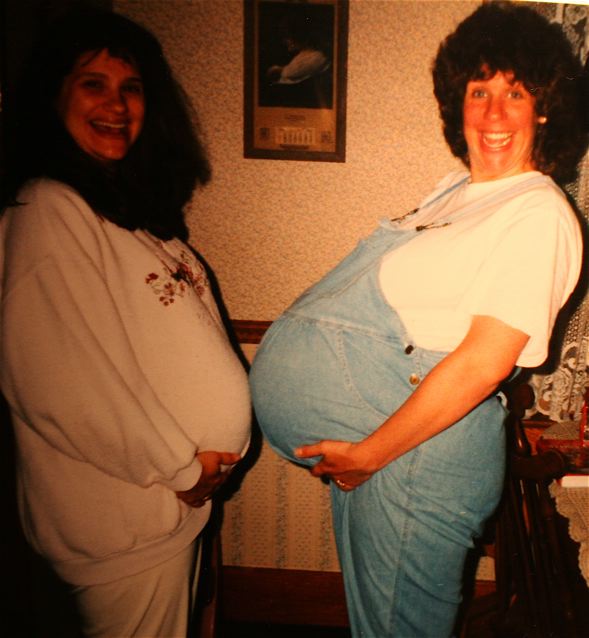
Two awesomely happy pregnant ladies. Who says it’s not fun to be as big as a brick house? Pregnancy and childbirth are hilarious. Photo courtesy of Karen Driscoll.
Related posts:
Home Birth Rising During Covid
Vaccines During Pregnancy: Which Do You Need?
How to Prepare for Labor
Published: March 23, 2015
Updated: April 8, 2021
Love this! You are spot on with so many points. I remember being really reluctant to accept help when my son was born. One of my friends got a whole bunch of people to organize meals for me for a few weeks, and it was so amazingly helpful, although I secretly felt a bit guilty at the time. I remember feeling bad asking my husband or my mom (who stayed with us for two weeks after the birth, although she was not there for the birth) to get me a glass or water or a second helping of dinner when my hands were full; I remember my mom feeding me during a few of those times, because I needed both hands to nurse my baby, and I felt bad about that too (although it was also pretty funny). I felt bad asking my mom to watch my son for an hour so that I could take a much-needed nap. I recognize now just how much I needed that help, and I am so thankful that my mama took the initiative in many cases to make sure I got what I needed, because most of the time I couldn’t or wouldn’t ask on my own.
Also, as far as exercise goes… there’s an amazing book called “The Pregnant Athlete” that I recommend to anyone who is trying to keep fit during pregnancy. Contains a wealth of information about how important it is, as well as ways to adapt exercises to fit your body and whole workouts. I so wish that book had existed when I was pregnant!
I love this post! As someone who got to have the birth *I* wanted with my only child, I agree that women are 100% entitled to the birth they want. I also think the diet and exercise information is what women need to hear when pregnant! Some cultures have traditional teachings and taboos around diet and stress prevention (in America this looks like exercise and self-care) during pregnancy. We could learn a thing or two from this.